Analyzing Peter Smith's Case: A Healthcare Law and Ethics Study
VerifiedAdded on 2022/09/30
|8
|1582
|89
Case Study
AI Summary
This case study delves into the legal and ethical dilemmas surrounding the case of Peter Smith, an 82-year-old man with dementia and an existing Advanced Health Directive (AHD). The analysis covers key legislation such as the Work Health and Safety Act 2011, Civil Liability Act 2003, and principles related to medical power of attorney and AHDs. Ethical considerations include beneficence, non-maleficence, and patient autonomy, particularly in the context of Peter's AHD and his current diminished mental state. The study also references codes and standards for nurses from the ICN and NMBA, highlighting the importance of professional conduct and patient care. The conclusion suggests prioritizing patient well-being while navigating the legal complexities of the AHD, recommending consultation with an attorney to ensure Peter receives appropriate medical treatment.
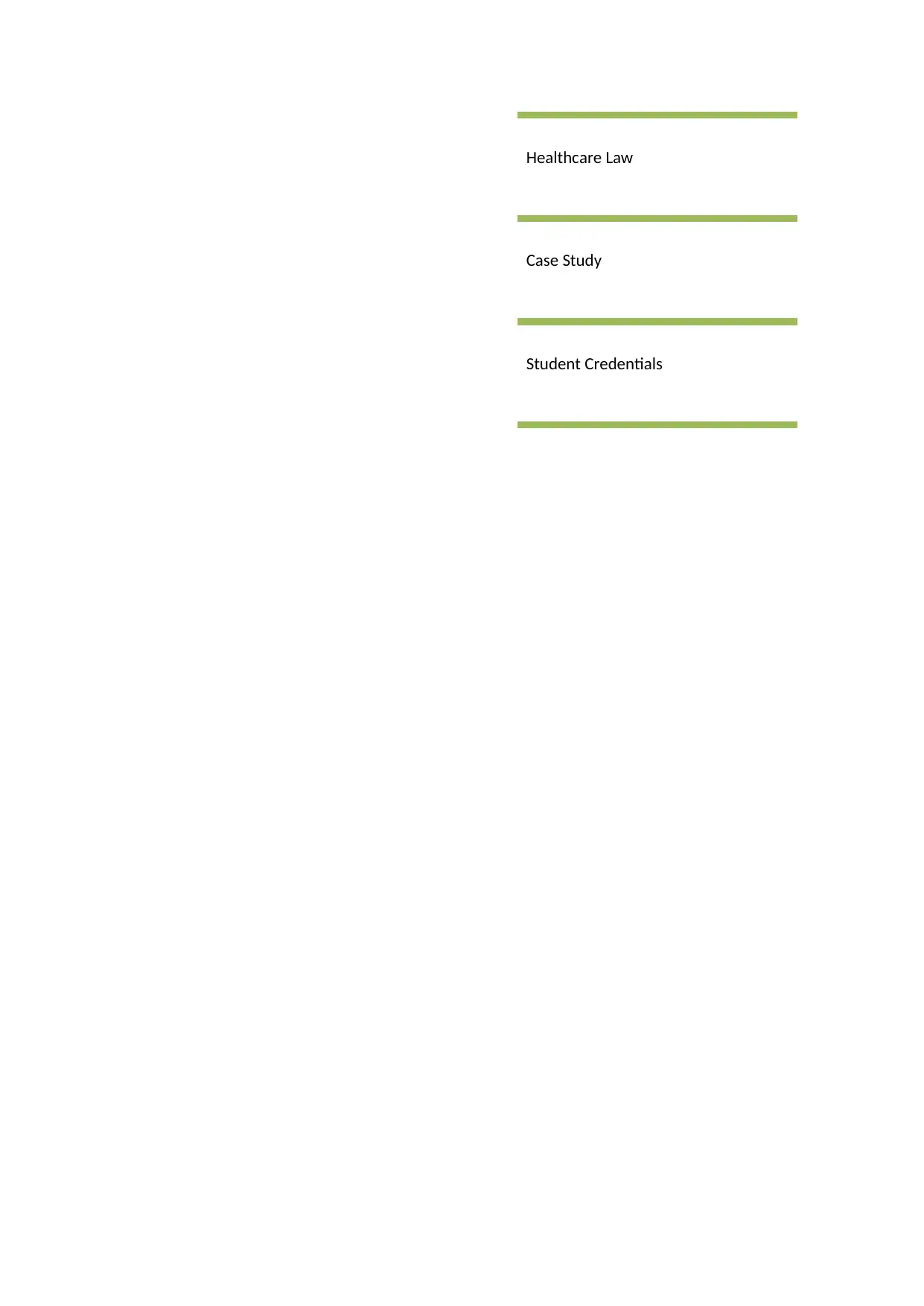
Healthcare Law
Case Study
Student Credentials
Case Study
Student Credentials
Paraphrase This Document
Need a fresh take? Get an instant paraphrase of this document with our AI Paraphraser
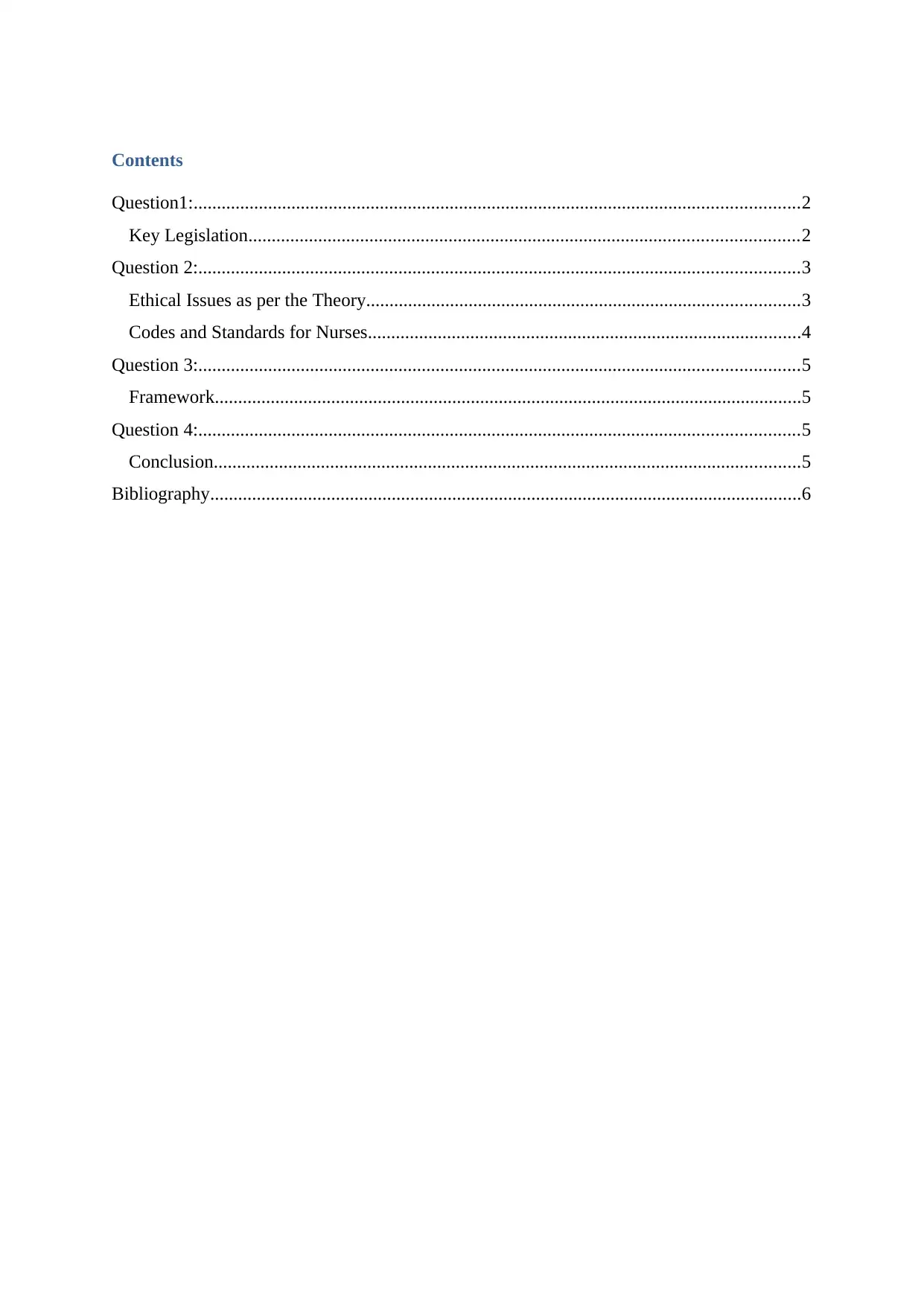
Contents
Question1:..................................................................................................................................2
Key Legislation......................................................................................................................2
Question 2:.................................................................................................................................3
Ethical Issues as per the Theory.............................................................................................3
Codes and Standards for Nurses.............................................................................................4
Question 3:.................................................................................................................................5
Framework..............................................................................................................................5
Question 4:.................................................................................................................................5
Conclusion..............................................................................................................................5
Bibliography...............................................................................................................................6
Question1:..................................................................................................................................2
Key Legislation......................................................................................................................2
Question 2:.................................................................................................................................3
Ethical Issues as per the Theory.............................................................................................3
Codes and Standards for Nurses.............................................................................................4
Question 3:.................................................................................................................................5
Framework..............................................................................................................................5
Question 4:.................................................................................................................................5
Conclusion..............................................................................................................................5
Bibliography...............................................................................................................................6
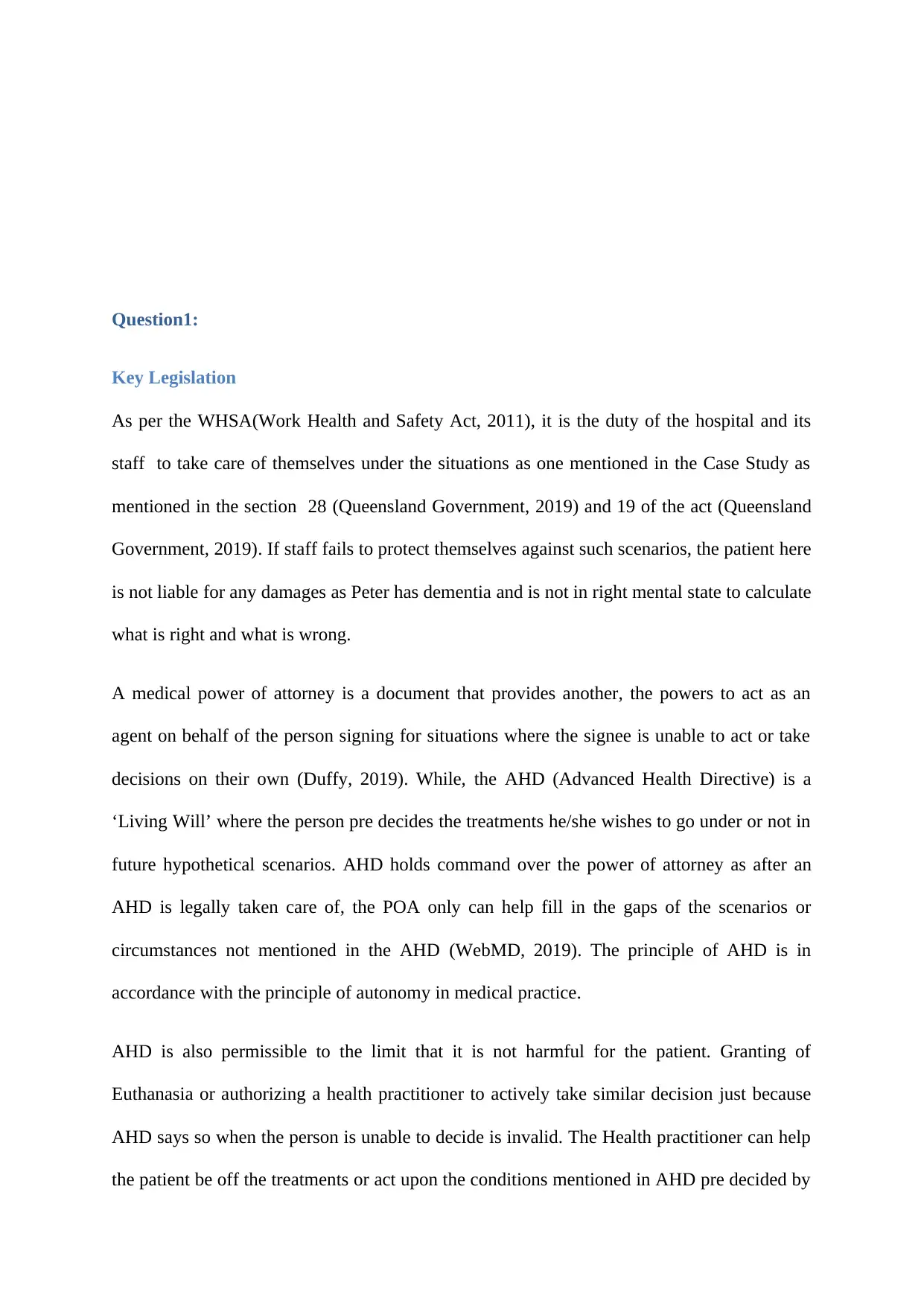
Question1:
Key Legislation
As per the WHSA(Work Health and Safety Act, 2011), it is the duty of the hospital and its
staff to take care of themselves under the situations as one mentioned in the Case Study as
mentioned in the section 28 (Queensland Government, 2019) and 19 of the act (Queensland
Government, 2019). If staff fails to protect themselves against such scenarios, the patient here
is not liable for any damages as Peter has dementia and is not in right mental state to calculate
what is right and what is wrong.
A medical power of attorney is a document that provides another, the powers to act as an
agent on behalf of the person signing for situations where the signee is unable to act or take
decisions on their own (Duffy, 2019). While, the AHD (Advanced Health Directive) is a
‘Living Will’ where the person pre decides the treatments he/she wishes to go under or not in
future hypothetical scenarios. AHD holds command over the power of attorney as after an
AHD is legally taken care of, the POA only can help fill in the gaps of the scenarios or
circumstances not mentioned in the AHD (WebMD, 2019). The principle of AHD is in
accordance with the principle of autonomy in medical practice.
AHD is also permissible to the limit that it is not harmful for the patient. Granting of
Euthanasia or authorizing a health practitioner to actively take similar decision just because
AHD says so when the person is unable to decide is invalid. The Health practitioner can help
the patient be off the treatments or act upon the conditions mentioned in AHD pre decided by
Key Legislation
As per the WHSA(Work Health and Safety Act, 2011), it is the duty of the hospital and its
staff to take care of themselves under the situations as one mentioned in the Case Study as
mentioned in the section 28 (Queensland Government, 2019) and 19 of the act (Queensland
Government, 2019). If staff fails to protect themselves against such scenarios, the patient here
is not liable for any damages as Peter has dementia and is not in right mental state to calculate
what is right and what is wrong.
A medical power of attorney is a document that provides another, the powers to act as an
agent on behalf of the person signing for situations where the signee is unable to act or take
decisions on their own (Duffy, 2019). While, the AHD (Advanced Health Directive) is a
‘Living Will’ where the person pre decides the treatments he/she wishes to go under or not in
future hypothetical scenarios. AHD holds command over the power of attorney as after an
AHD is legally taken care of, the POA only can help fill in the gaps of the scenarios or
circumstances not mentioned in the AHD (WebMD, 2019). The principle of AHD is in
accordance with the principle of autonomy in medical practice.
AHD is also permissible to the limit that it is not harmful for the patient. Granting of
Euthanasia or authorizing a health practitioner to actively take similar decision just because
AHD says so when the person is unable to decide is invalid. The Health practitioner can help
the patient be off the treatments or act upon the conditions mentioned in AHD pre decided by
⊘ This is a preview!⊘
Do you want full access?
Subscribe today to unlock all pages.

Trusted by 1+ million students worldwide
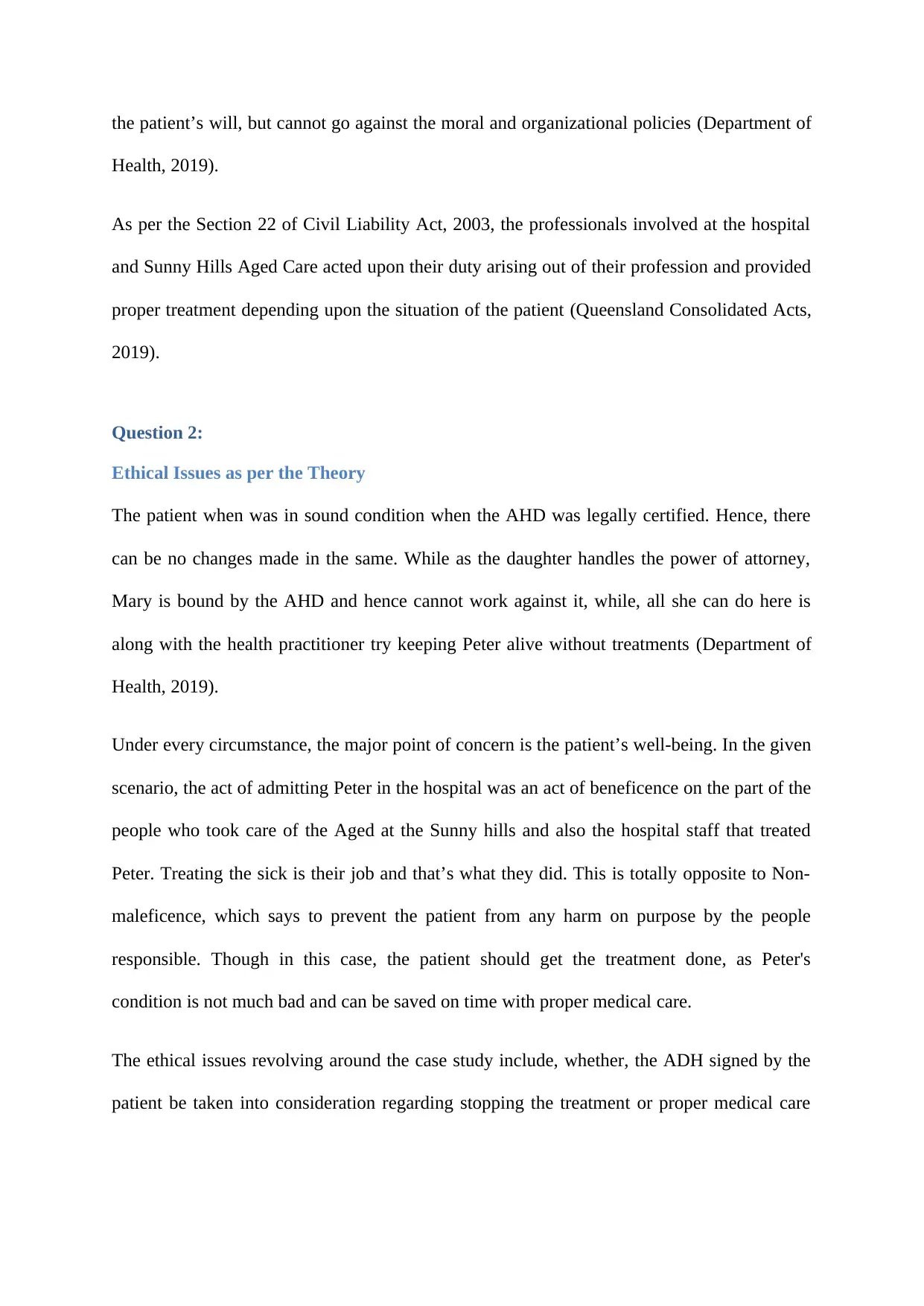
the patient’s will, but cannot go against the moral and organizational policies (Department of
Health, 2019).
As per the Section 22 of Civil Liability Act, 2003, the professionals involved at the hospital
and Sunny Hills Aged Care acted upon their duty arising out of their profession and provided
proper treatment depending upon the situation of the patient (Queensland Consolidated Acts,
2019).
Question 2:
Ethical Issues as per the Theory
The patient when was in sound condition when the AHD was legally certified. Hence, there
can be no changes made in the same. While as the daughter handles the power of attorney,
Mary is bound by the AHD and hence cannot work against it, while, all she can do here is
along with the health practitioner try keeping Peter alive without treatments (Department of
Health, 2019).
Under every circumstance, the major point of concern is the patient’s well-being. In the given
scenario, the act of admitting Peter in the hospital was an act of beneficence on the part of the
people who took care of the Aged at the Sunny hills and also the hospital staff that treated
Peter. Treating the sick is their job and that’s what they did. This is totally opposite to Non-
maleficence, which says to prevent the patient from any harm on purpose by the people
responsible. Though in this case, the patient should get the treatment done, as Peter's
condition is not much bad and can be saved on time with proper medical care.
The ethical issues revolving around the case study include, whether, the ADH signed by the
patient be taken into consideration regarding stopping the treatment or proper medical care
Health, 2019).
As per the Section 22 of Civil Liability Act, 2003, the professionals involved at the hospital
and Sunny Hills Aged Care acted upon their duty arising out of their profession and provided
proper treatment depending upon the situation of the patient (Queensland Consolidated Acts,
2019).
Question 2:
Ethical Issues as per the Theory
The patient when was in sound condition when the AHD was legally certified. Hence, there
can be no changes made in the same. While as the daughter handles the power of attorney,
Mary is bound by the AHD and hence cannot work against it, while, all she can do here is
along with the health practitioner try keeping Peter alive without treatments (Department of
Health, 2019).
Under every circumstance, the major point of concern is the patient’s well-being. In the given
scenario, the act of admitting Peter in the hospital was an act of beneficence on the part of the
people who took care of the Aged at the Sunny hills and also the hospital staff that treated
Peter. Treating the sick is their job and that’s what they did. This is totally opposite to Non-
maleficence, which says to prevent the patient from any harm on purpose by the people
responsible. Though in this case, the patient should get the treatment done, as Peter's
condition is not much bad and can be saved on time with proper medical care.
The ethical issues revolving around the case study include, whether, the ADH signed by the
patient be taken into consideration regarding stopping the treatment or proper medical care
Paraphrase This Document
Need a fresh take? Get an instant paraphrase of this document with our AI Paraphraser
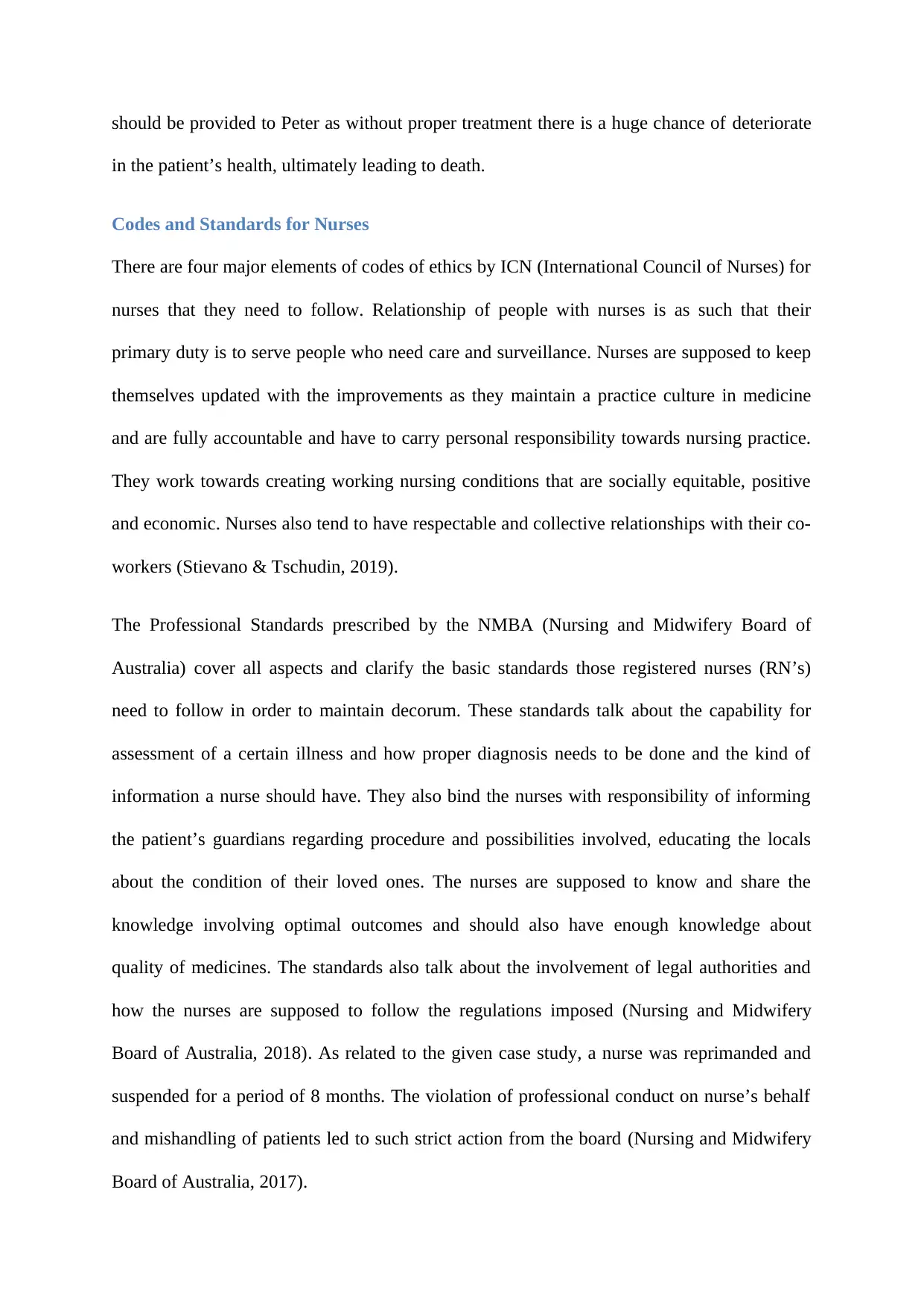
should be provided to Peter as without proper treatment there is a huge chance of deteriorate
in the patient’s health, ultimately leading to death.
Codes and Standards for Nurses
There are four major elements of codes of ethics by ICN (International Council of Nurses) for
nurses that they need to follow. Relationship of people with nurses is as such that their
primary duty is to serve people who need care and surveillance. Nurses are supposed to keep
themselves updated with the improvements as they maintain a practice culture in medicine
and are fully accountable and have to carry personal responsibility towards nursing practice.
They work towards creating working nursing conditions that are socially equitable, positive
and economic. Nurses also tend to have respectable and collective relationships with their co-
workers (Stievano & Tschudin, 2019).
The Professional Standards prescribed by the NMBA (Nursing and Midwifery Board of
Australia) cover all aspects and clarify the basic standards those registered nurses (RN’s)
need to follow in order to maintain decorum. These standards talk about the capability for
assessment of a certain illness and how proper diagnosis needs to be done and the kind of
information a nurse should have. They also bind the nurses with responsibility of informing
the patient’s guardians regarding procedure and possibilities involved, educating the locals
about the condition of their loved ones. The nurses are supposed to know and share the
knowledge involving optimal outcomes and should also have enough knowledge about
quality of medicines. The standards also talk about the involvement of legal authorities and
how the nurses are supposed to follow the regulations imposed (Nursing and Midwifery
Board of Australia, 2018). As related to the given case study, a nurse was reprimanded and
suspended for a period of 8 months. The violation of professional conduct on nurse’s behalf
and mishandling of patients led to such strict action from the board (Nursing and Midwifery
Board of Australia, 2017).
in the patient’s health, ultimately leading to death.
Codes and Standards for Nurses
There are four major elements of codes of ethics by ICN (International Council of Nurses) for
nurses that they need to follow. Relationship of people with nurses is as such that their
primary duty is to serve people who need care and surveillance. Nurses are supposed to keep
themselves updated with the improvements as they maintain a practice culture in medicine
and are fully accountable and have to carry personal responsibility towards nursing practice.
They work towards creating working nursing conditions that are socially equitable, positive
and economic. Nurses also tend to have respectable and collective relationships with their co-
workers (Stievano & Tschudin, 2019).
The Professional Standards prescribed by the NMBA (Nursing and Midwifery Board of
Australia) cover all aspects and clarify the basic standards those registered nurses (RN’s)
need to follow in order to maintain decorum. These standards talk about the capability for
assessment of a certain illness and how proper diagnosis needs to be done and the kind of
information a nurse should have. They also bind the nurses with responsibility of informing
the patient’s guardians regarding procedure and possibilities involved, educating the locals
about the condition of their loved ones. The nurses are supposed to know and share the
knowledge involving optimal outcomes and should also have enough knowledge about
quality of medicines. The standards also talk about the involvement of legal authorities and
how the nurses are supposed to follow the regulations imposed (Nursing and Midwifery
Board of Australia, 2018). As related to the given case study, a nurse was reprimanded and
suspended for a period of 8 months. The violation of professional conduct on nurse’s behalf
and mishandling of patients led to such strict action from the board (Nursing and Midwifery
Board of Australia, 2017).
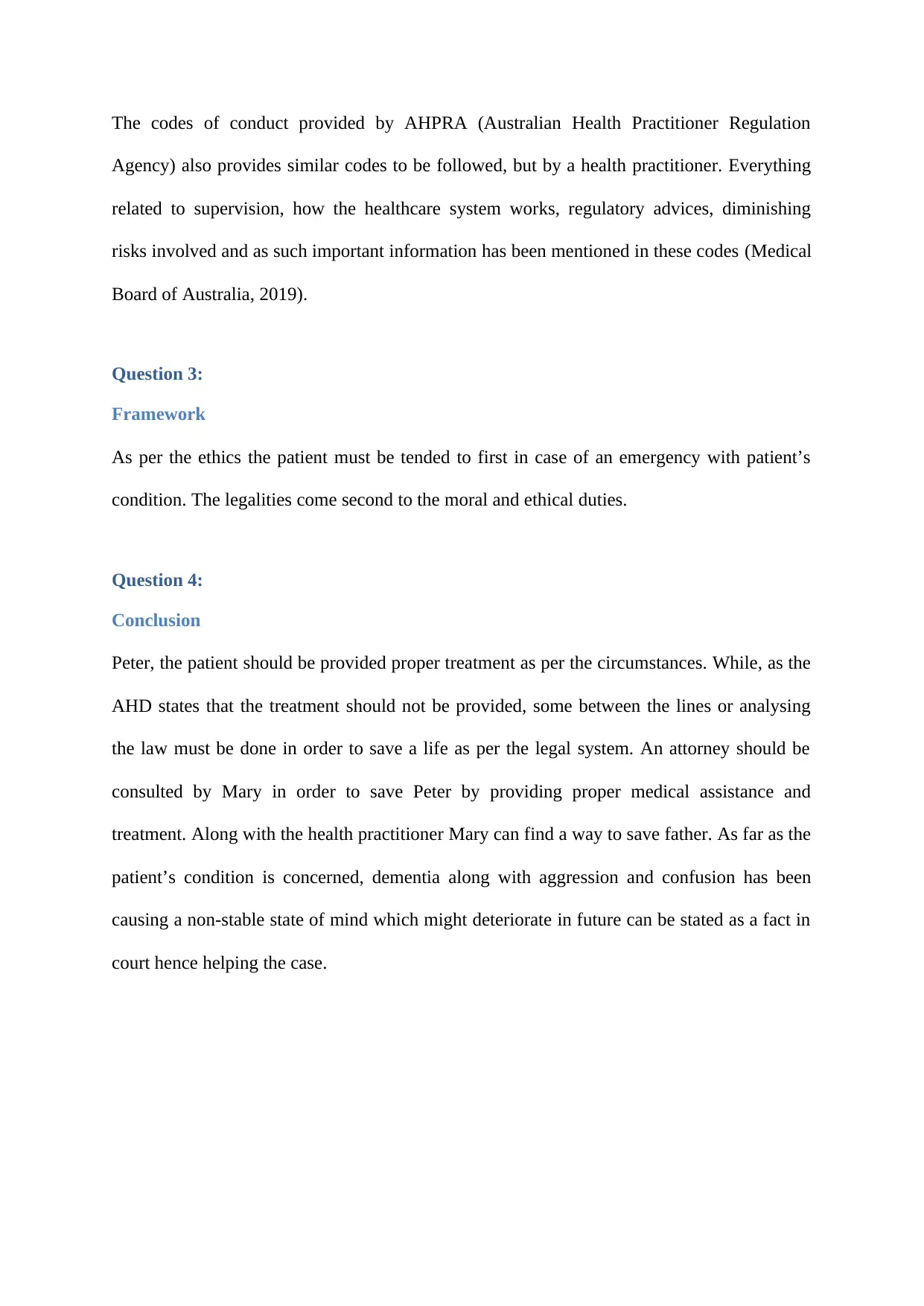
The codes of conduct provided by AHPRA (Australian Health Practitioner Regulation
Agency) also provides similar codes to be followed, but by a health practitioner. Everything
related to supervision, how the healthcare system works, regulatory advices, diminishing
risks involved and as such important information has been mentioned in these codes (Medical
Board of Australia, 2019).
Question 3:
Framework
As per the ethics the patient must be tended to first in case of an emergency with patient’s
condition. The legalities come second to the moral and ethical duties.
Question 4:
Conclusion
Peter, the patient should be provided proper treatment as per the circumstances. While, as the
AHD states that the treatment should not be provided, some between the lines or analysing
the law must be done in order to save a life as per the legal system. An attorney should be
consulted by Mary in order to save Peter by providing proper medical assistance and
treatment. Along with the health practitioner Mary can find a way to save father. As far as the
patient’s condition is concerned, dementia along with aggression and confusion has been
causing a non-stable state of mind which might deteriorate in future can be stated as a fact in
court hence helping the case.
Agency) also provides similar codes to be followed, but by a health practitioner. Everything
related to supervision, how the healthcare system works, regulatory advices, diminishing
risks involved and as such important information has been mentioned in these codes (Medical
Board of Australia, 2019).
Question 3:
Framework
As per the ethics the patient must be tended to first in case of an emergency with patient’s
condition. The legalities come second to the moral and ethical duties.
Question 4:
Conclusion
Peter, the patient should be provided proper treatment as per the circumstances. While, as the
AHD states that the treatment should not be provided, some between the lines or analysing
the law must be done in order to save a life as per the legal system. An attorney should be
consulted by Mary in order to save Peter by providing proper medical assistance and
treatment. Along with the health practitioner Mary can find a way to save father. As far as the
patient’s condition is concerned, dementia along with aggression and confusion has been
causing a non-stable state of mind which might deteriorate in future can be stated as a fact in
court hence helping the case.
⊘ This is a preview!⊘
Do you want full access?
Subscribe today to unlock all pages.

Trusted by 1+ million students worldwide
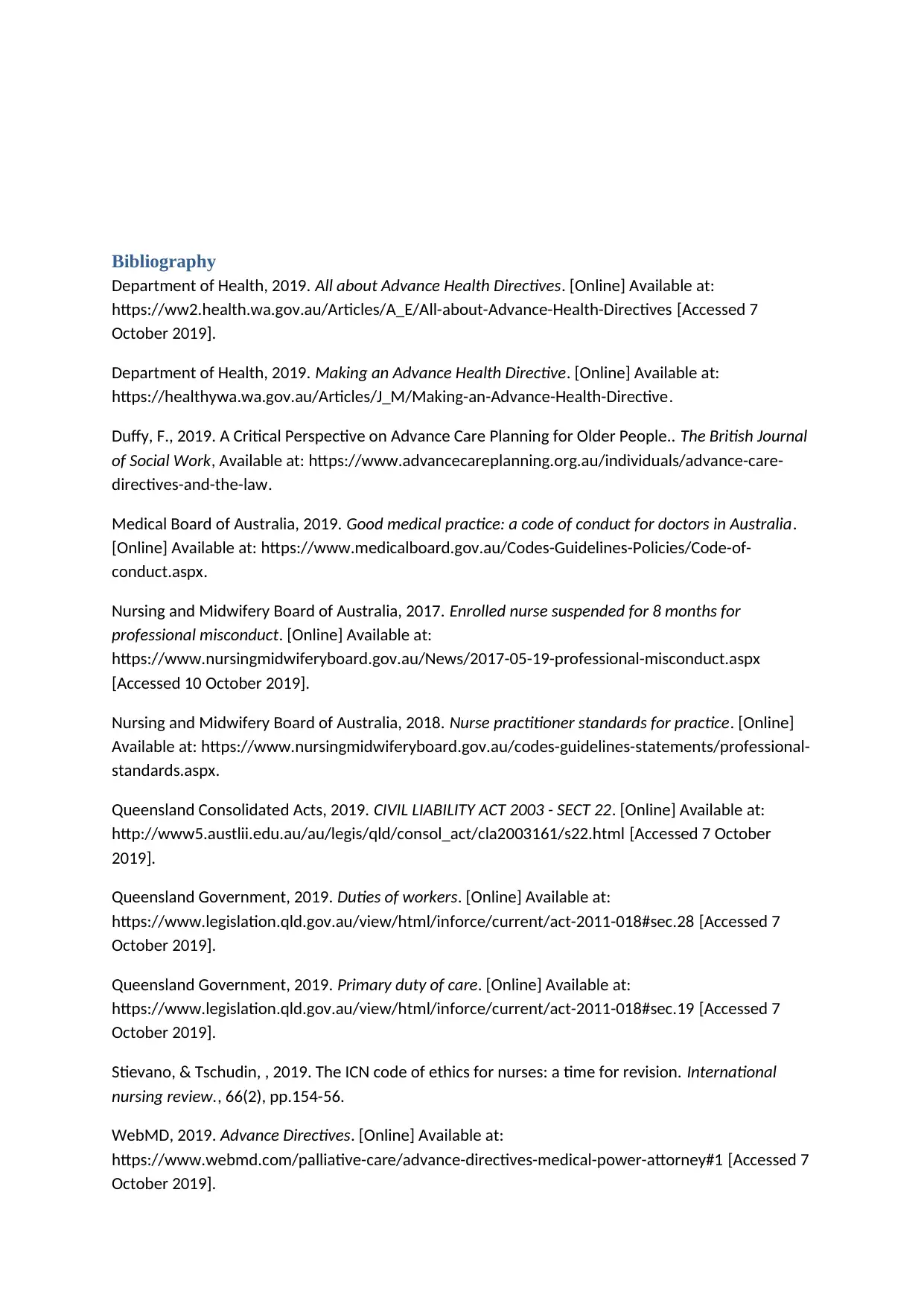
Bibliography
Department of Health, 2019. All about Advance Health Directives. [Online] Available at:
https://ww2.health.wa.gov.au/Articles/A_E/All-about-Advance-Health-Directives [Accessed 7
October 2019].
Department of Health, 2019. Making an Advance Health Directive. [Online] Available at:
https://healthywa.wa.gov.au/Articles/J_M/Making-an-Advance-Health-Directive.
Duffy, F., 2019. A Critical Perspective on Advance Care Planning for Older People.. The British Journal
of Social Work, Available at: https://www.advancecareplanning.org.au/individuals/advance-care-
directives-and-the-law.
Medical Board of Australia, 2019. Good medical practice: a code of conduct for doctors in Australia.
[Online] Available at: https://www.medicalboard.gov.au/Codes-Guidelines-Policies/Code-of-
conduct.aspx.
Nursing and Midwifery Board of Australia, 2017. Enrolled nurse suspended for 8 months for
professional misconduct. [Online] Available at:
https://www.nursingmidwiferyboard.gov.au/News/2017-05-19-professional-misconduct.aspx
[Accessed 10 October 2019].
Nursing and Midwifery Board of Australia, 2018. Nurse practitioner standards for practice. [Online]
Available at: https://www.nursingmidwiferyboard.gov.au/codes-guidelines-statements/professional-
standards.aspx.
Queensland Consolidated Acts, 2019. CIVIL LIABILITY ACT 2003 - SECT 22. [Online] Available at:
http://www5.austlii.edu.au/au/legis/qld/consol_act/cla2003161/s22.html [Accessed 7 October
2019].
Queensland Government, 2019. Duties of workers. [Online] Available at:
https://www.legislation.qld.gov.au/view/html/inforce/current/act-2011-018#sec.28 [Accessed 7
October 2019].
Queensland Government, 2019. Primary duty of care. [Online] Available at:
https://www.legislation.qld.gov.au/view/html/inforce/current/act-2011-018#sec.19 [Accessed 7
October 2019].
Stievano, & Tschudin, , 2019. The ICN code of ethics for nurses: a time for revision. International
nursing review., 66(2), pp.154-56.
WebMD, 2019. Advance Directives. [Online] Available at:
https://www.webmd.com/palliative-care/advance-directives-medical-power-attorney#1 [Accessed 7
October 2019].
Department of Health, 2019. All about Advance Health Directives. [Online] Available at:
https://ww2.health.wa.gov.au/Articles/A_E/All-about-Advance-Health-Directives [Accessed 7
October 2019].
Department of Health, 2019. Making an Advance Health Directive. [Online] Available at:
https://healthywa.wa.gov.au/Articles/J_M/Making-an-Advance-Health-Directive.
Duffy, F., 2019. A Critical Perspective on Advance Care Planning for Older People.. The British Journal
of Social Work, Available at: https://www.advancecareplanning.org.au/individuals/advance-care-
directives-and-the-law.
Medical Board of Australia, 2019. Good medical practice: a code of conduct for doctors in Australia.
[Online] Available at: https://www.medicalboard.gov.au/Codes-Guidelines-Policies/Code-of-
conduct.aspx.
Nursing and Midwifery Board of Australia, 2017. Enrolled nurse suspended for 8 months for
professional misconduct. [Online] Available at:
https://www.nursingmidwiferyboard.gov.au/News/2017-05-19-professional-misconduct.aspx
[Accessed 10 October 2019].
Nursing and Midwifery Board of Australia, 2018. Nurse practitioner standards for practice. [Online]
Available at: https://www.nursingmidwiferyboard.gov.au/codes-guidelines-statements/professional-
standards.aspx.
Queensland Consolidated Acts, 2019. CIVIL LIABILITY ACT 2003 - SECT 22. [Online] Available at:
http://www5.austlii.edu.au/au/legis/qld/consol_act/cla2003161/s22.html [Accessed 7 October
2019].
Queensland Government, 2019. Duties of workers. [Online] Available at:
https://www.legislation.qld.gov.au/view/html/inforce/current/act-2011-018#sec.28 [Accessed 7
October 2019].
Queensland Government, 2019. Primary duty of care. [Online] Available at:
https://www.legislation.qld.gov.au/view/html/inforce/current/act-2011-018#sec.19 [Accessed 7
October 2019].
Stievano, & Tschudin, , 2019. The ICN code of ethics for nurses: a time for revision. International
nursing review., 66(2), pp.154-56.
WebMD, 2019. Advance Directives. [Online] Available at:
https://www.webmd.com/palliative-care/advance-directives-medical-power-attorney#1 [Accessed 7
October 2019].
Paraphrase This Document
Need a fresh take? Get an instant paraphrase of this document with our AI Paraphraser

1 out of 8
Related Documents
Your All-in-One AI-Powered Toolkit for Academic Success.
+13062052269
info@desklib.com
Available 24*7 on WhatsApp / Email
![[object Object]](/_next/static/media/star-bottom.7253800d.svg)
Unlock your academic potential
Copyright © 2020–2026 A2Z Services. All Rights Reserved. Developed and managed by ZUCOL.





